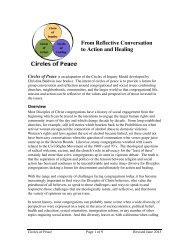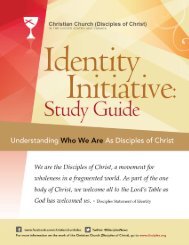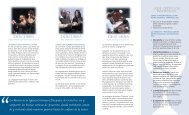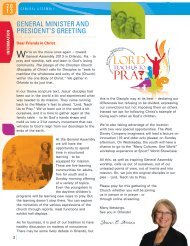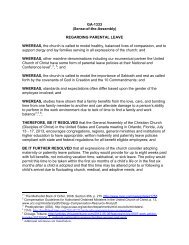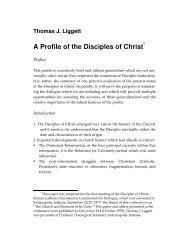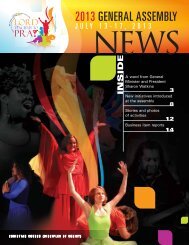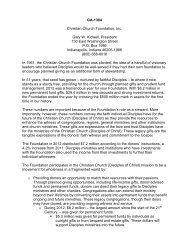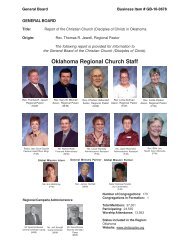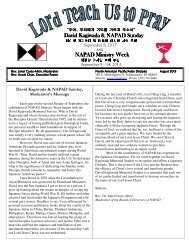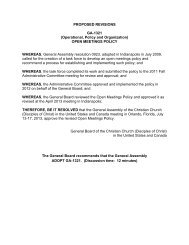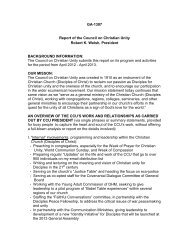RESOURCING THE CHURCH FOR ECUMENICAL MINISTRy A ...
RESOURCING THE CHURCH FOR ECUMENICAL MINISTRy A ...
RESOURCING THE CHURCH FOR ECUMENICAL MINISTRy A ...
You also want an ePaper? Increase the reach of your titles
YUMPU automatically turns print PDFs into web optimized ePapers that Google loves.
If you want people to build a boat, don’t just<br />
give them a blueprint, but let them be filled<br />
with a yearning for the vastness of the sea.<br />
I am pleased to note that the text affirms the goals of<br />
church unity and common witness, but it never<br />
suggests that these goals might stem from a theological<br />
mandate rooted in scripture. But, then,<br />
there is no reference to scripture whatsoever. There<br />
are references to the church, but those are set<br />
alongside an emphasis on agencies and specialized<br />
ministries as crucial for the ecumenical family.<br />
Ecumenism, in short, is reduced to cooperation on<br />
behalf of peace and justice. The idea that God has<br />
called forth a community, centered in Christ and<br />
empowered by the Holy Spirit, to be an embodied<br />
expression of God’s reconciling power and purpose,<br />
is completely absent. (Similar things could be said<br />
about some statements of the NCC.)<br />
Am I saying this directly enough? If we want a vital<br />
ecumenical witness in the coming generation, then<br />
we dare not reduce a divine initiative to a purely<br />
human enterprise. If we don’t believe that God has<br />
acted in Christ for the world’s redemption, then the<br />
idea that God through the Incarnation has brought<br />
forth a new community of Jew and Greek,<br />
Protestant and Catholic, black and white, gay and<br />
straight, Iraqi and American will seem like pure<br />
idealism—impossible and, ultimately, irrelevant. In<br />
the absence of such conviction, the ecumenical<br />
movement will become simply another arena for<br />
pursuing political agendas or another set of agencies<br />
engaged in occasional cooperation—easily demoted<br />
on the list of ecclesiastical priorities. The National<br />
Council of Churches (about which you may have<br />
questions and comments) is suffering the effects of<br />
this theological impoverishment.<br />
I hope, therefore, that we have not come here to<br />
rearrange ecumenical furniture, to discuss structural<br />
changes (though they may be needed) as if that<br />
were inherently renewing, but to hear God’s Word<br />
and be renewed by God’s Spirit. Antoine de San<br />
Exupery may have said it best: If you want people to<br />
build a boat, don’t just give them a blueprint, but let<br />
them be filled with a yearning for the vastness of the<br />
sea.<br />
My second concluding point stems from my<br />
experience a week ago at Edinburgh 2010. As you<br />
probably know, the symbolic beginning of the<br />
Kinnamon • A Century of Witness, a Journey of Wholeness<br />
8<br />
modern ecumenical movement was a world mission<br />
conference held in Edinburgh one hundred years<br />
ago this very month. Peter Ainslie drew inspiration<br />
for the Disciples Council on Christian Unity from<br />
that historic event. The recent conference was<br />
intended to assess what we have learned about<br />
mission and unity over the past century, and to chart<br />
a course for the future. I will be happy to speak about<br />
the whole Edinburgh 2010 experience over dinner<br />
or in the hallway, but for now I want simply to note<br />
that the basic message of the conference was that the<br />
church must recover a sense of urgency about its<br />
witness. The biggest critique of the church seemed<br />
to be that it has become too timid at a time when the<br />
world needs bold proclamation of the gospel.<br />
Well, yes, that is surely a problem and challenge. But<br />
in my judgment, the church has not only borne<br />
tepid witness, it has frequently borne false witness.<br />
We not only need encouragement, but renewal.<br />
Like you, I suspect, I have lots of secular friends and<br />
family members. As they see it, the church in<br />
general often bears witness to four things: (a) abuse<br />
and the scandal of cover up; (b) intolerance of those<br />
who are different; (c) irrelevance to the most<br />
pressing problems of the day; and, (d) fragmentation.<br />
Of course, it is easy to say, “That’s those<br />
other Christians!” But surely, it is in the spirit of 1<br />
Corinthians 12 to insist that when one part of the<br />
body sins or falters, all are implicated with it. And<br />
besides, who can deny that our own witness is one<br />
of fragmentation?<br />
On the way back from Edinburgh, I read a new book<br />
setting forth a theology of the Rwandan genocide.<br />
And it struck me that, while Rwanda figured prominently<br />
in the conference (as it did at the Athens<br />
world mission conference in 2005), it did so only as<br />
a case study in the need for reconciliation—not as an<br />
exploration of the failure of the church!<br />
I say all of this as a reminder that the ecumenical<br />
movement is not only about unity, but unity<br />
through repentance and renewal. My fear, however, is<br />
that ecumenism in this country is often a cover for<br />
maintaining the ecclesial status quo, a way of<br />
cooperating just enough so that we can preserve<br />
current patterns of church life.<br />
And so my prayer for this meeting: that, with God’s<br />
guidance, we come here not to tinker with structures<br />
or to give pep talks, but to examine honestly our<br />
failures and to listen attentively to God’s calling—<br />
that the years ahead, with God’s help, will truly be a<br />
journey of wholeness.



